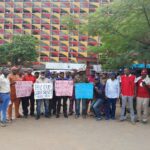The impending industrial action over minimum wage increment by the Nigerian Labour Congress (NLC) might not affect flight operations as the air traffic controllers have said they will man their duty posts.
The President, Nigerian Air Traffic Controllers Association (NATCA), Mr. Victor Eyaru, disclosed this to journalists at the sidelines of the annual Africa and Middle East Regional meeting of International Federation of Air Traffic Controllers Association (IFATCA) holding in Abuja.
“We are not part of the strike because we have discussed with our mother union which is Air Transport Senior Staff Association of Nigeria (ATSSAN) and Trade Union Congress (TUC),” he said.
He added that they are “working out a way because of the IFATCA conference in order not to disturb flight operations especially for our international delegates.”
Speaking on measures to ensure safer skies, he said, after the conference, there will be a communiqué to inform the government that some infrastructure needs to be replaced at the airports.
“To ensure safe sky, the infrastructure has to be developed. If we have infrastructure, then we can develop. Most of our domestic airports don’t fly in the night and it is because there are no night equipments like runway lights, approach lights that will enable the airlines go there in the night.
“If runway lights are there, the airlines will make efforts to be flying into those airports and the truth is that most of those airports are under-utilized because of the lack of infrastructures,” he explained.
On the replacement of radar, he said: “We have discussed with government on the need to replace the radar. The ones we have, we are managing it. It is not as if it is bad but being that it is a radar, if an air traffic controller is working and the radar fails, then it means it goes back to its old ways of providing air traffic control which is procedural; it delays aircrafts, it makes them burn fuel which makes the airlines unhappy,” he noted.
Also speaking at the event, the minister of State for Aviation, Sen. Hadi Sirika, said the Federal Government is committed to air traffic control especially through training and retraining because the lives of the people that are in the sky is dependent on the air traffic controller.
“Since assumption of office, we have trained about 86 and we are currently training 46. We are also trying to strengthen the capacity of NCAT in order to handle much numbers in the coming years.
“Some states government like Kano trained about 48 of the air traffic controllers with state funding which we have absolved,” he noted.

 Join Daily Trust WhatsApp Community For Quick Access To News and Happenings Around You.
Join Daily Trust WhatsApp Community For Quick Access To News and Happenings Around You.


